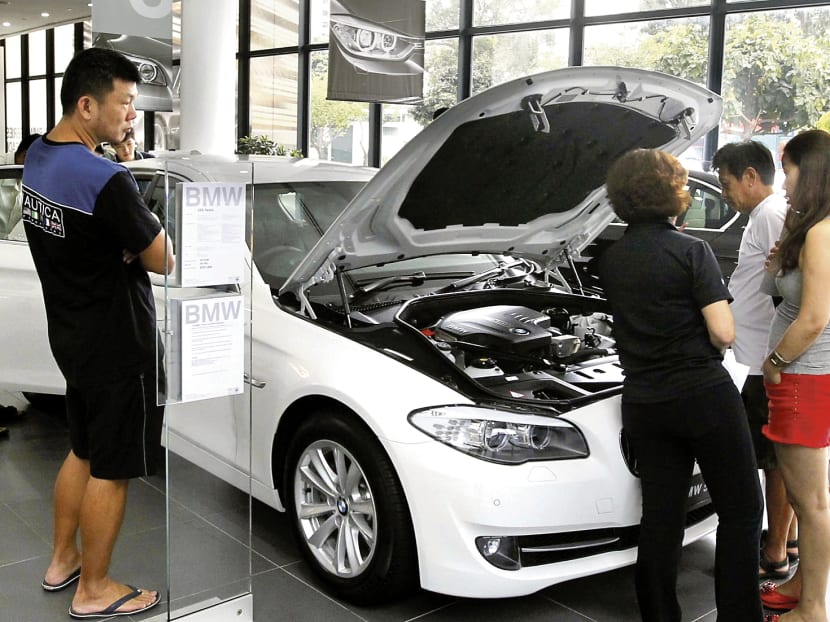Higher borrowing limit, longer tenures for car loans
SINGAPORE – Vehicle buyers will be able to take higher and longer loans starting Friday (May 27), after the Monetary Authority of Singapore (MAS) eased the restrictions on motor vehicle financing, citing the sustained moderation in COE prices which has lowered inflationary pressures over the last three years.
SINGAPORE – Three years after it imposed loan limits that sparked an outcry from car dealers, the Monetary Authority of Singapore (MAS) announced on Thursday (May 26) that it would relax restrictions on motor vehicle financing, citing the sustained moderation in COE prices that has eased inflationary pressures.
With the changes kicking in on Friday, buyers will be able to borrow up to 70 per cent of a vehicle’s purchase price, up from the current 60 per cent, for vehicles with an open market value (OMV) of less than or equal to S$20,000. The limit will be raised to 60 per cent, up from 50 per cent, for vehicles with OMV higher than S$20,000. Buyers will also be able to take up to seven years to repay the loans, up from five years.
The revised financing restrictions will apply to non-MAS-regulated entities that extend motor vehicle financing on a hire-purchase basis and licensed moneylenders.
With the change, the downpayment for a, say, Toyota Corolla Altis (which starts at S$109,888) will fall from S$43,956 to S$32,966. Taking the current interest rate of 2.68 per cent, monthly repayments will become S$1,005 for seven years, down from S$1,175 for five years.
Reaction among dealers and analysts to the MAS’ move was mixed, with some expecting more buyers to be drawn in and drive up COE prices despite the higher quota while others said it would not translate into any significant impact in the market given the lacklustre economic conditions.
When the car loan restrictions were re-introduced in 2013 — they were previously in place from February 1995 to January 2003 — the Government said it was with an eye on bringing down the sky-high COE premiums and to alleviate overall inflationary pressures in the economy. Another reason cited then was to “encourage financial prudence among buyers … in this prolonged environment of very low interest rates”.
The limits were introduced after four years of climbing COE prices where premiums surged to a historic high of S$92,100 for small cars, and S$96,210 for big cars. The move sparked concerns among Members of Parliament, who described it as “drastic” and “sudden”, although Deputy Prime Minister Tharman Shanmugaratnam explained that it was necessary to control COE prices to keep inflation, which affects Singaporeans and the broader economy, in check.
On the ground, used-car dealers pleaded for help after they failed to close a single deal in weeks in the aftermath. In response, the MAS temporarily lifted the loan curbs for 60 days for used-car dealers for their pre-existing stock.
COE prices started stabilising from April last year, decreasing steadily until premiums for small cars came below S$50,000 in January this year — the first time in four years.
The contribution of private road transport (excluding petrol) to CPI-All Items inflation has eased from 1.3 percentage points from 2011 to 2012, to -0.5 percentage point in the first quarter of this year. Outstanding motor vehicle loans have also declined by 32 per cent from S$14.13 billion when the restrictions kicked in in 2013 to S$9.55 billion in the first quarter this year.
In a statement on Thursday, MAS deputy managing director Ong Chong Tee said demand conditions for COE have moderated “and it is timely to ease the measures”.
But the limits will be kept in place for the long term to promote financial prudence and help support the promotion of a car-lite society, said the MAS.
Some experts said more buyers could enter the market and put pressure on COE premiums. Managing director of car dealer CarTimes Automobile Eddie Loo said the higher and longer loans mean monthly instalment payments would be more affordable.
SIM University senior lecturer Walter Theseira said the pool should not expand significantly, since many of those looking to buy are those who recently scrapped their cars bought in the mid-2000s when COE prices were very low. “Some of the owners of those cars would likely not be able to afford a car on Friday, given the higher COE prices and the more restrictive vehicle financing framework,” he added.
General manager of Tan Chong Motor Ron Lim was sceptical of the move leading to an immediate increase in demand for cars due to the current economy. “Car retail sales have experienced a slowdown for the (past) couple of months, but (the) COE was held up because of the presence of (private-hire firms like) Uber, so it’s not a real reflection of the actual market demand.”







